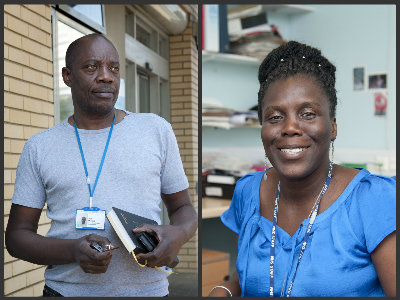
Lorraine Spence, social worker and Approved Mental Health Professional (AMHP)
Tell us a bit about your role
I’ve worked in mental health in Lambeth for 21 years and been in the forensic team for 13 years but I’m about to leave. I’ve seen some people who came into the services as young adults when I started here in Lambeth 21 years ago, who are now forensic. So their profile has escalated and their risk has escalated.
Would you recommend people get into forensic social work?
Forensics is really good. You learn a lot about the environments people are in, how the community is very different from a medium secure unit. You see how nursing is very different in a medium secure unit to an ordinary acute ward, how patients are perceived and how the jargon and language is very different.
It is a whole different side to mental health. Sometimes people who come into it without experience can be shocked by what you read about people from all sorts of backgrounds. Anybody can become unwell.
Why are you leaving?
I think when you get to the stage when you don’t enjoy it and you feel burnt out, it is time for a change. If you feel you can’t give a good service, then you shouldn’t do the job. That’s just my personal point of view. I am going to miss it. I’m going to miss some of the patients and the staff. I have to admit I won’t miss the politics.
I’ll be sad to leave. I’ve got some people on my caseload who I’ve been their social worker for 13 years. It has been really difficult. With some of them I didn’t realise just how well we got on.
What’s your next dream job then?
This is kind of weird. I had decided that I didn’t want my next role to have anything to do with social work at all. But having talked to you I actually realise that I am still a social worker at heart. I’ve listened to how I’ve sounded and the enthusiasm and pride in my voice and I think I probably actually will do it again. I think I will. I just need a break first.
Paul Mukasa, social worker
How do you find forensic social work?
It is never boring. There is always a lot to do. If you were a scriptwriter you might not believe some of the things that happen. I recently had to look after two birds for the weekend. They were my patients’ pets, he’d relapsed and had to be recalled to hospital. It was late on a Friday night, we couldn’t leave the birds so I agreed to look after them until a solution could be found on Monday morning.
You’ve worked at Broadmoor, what was that like?
Very, very interesting. Some people can be very, very hostile to the system. Some stay there for about 10 years not engaging at all. You have to find a way but it’s hard because everything is tied to risks. The guy might have killed five people but doesn’t want to talk about his offending behaviour so you have to find a way to start a conversation. It’s a challenge.
What’s the hardest part of your job?
When it comes to recommending that someone should leave the forensic service. You just sit knowing that you cannot overlook any simple little detail that might mean it’s too much of a risk. But in the main it is a very nice job. I used to work in child protection when I first qualified. In that job I didn’t sleep.
Andy McNicoll is Community Care’s community editor

 A trauma-informed approach to social work: practice tips
A trauma-informed approach to social work: practice tips  Problem gambling: how to recognise the warning signs
Problem gambling: how to recognise the warning signs 




 Find out how to develop your emotional resilience with our free downloadable guide
Find out how to develop your emotional resilience with our free downloadable guide  Develop your social work career with Community Care’s Careers and Training Guide
Develop your social work career with Community Care’s Careers and Training Guide  ‘Dear Sajid Javid: please end the inappropriate detention of autistic people and those with learning disabilities’
‘Dear Sajid Javid: please end the inappropriate detention of autistic people and those with learning disabilities’ Ofsted calls for power to scrutinise children’s home groups
Ofsted calls for power to scrutinise children’s home groups Seven in eight commissioners paying below ‘minimum rate for home care’
Seven in eight commissioners paying below ‘minimum rate for home care’
 Facebook
Facebook X
X LinkedIn
LinkedIn Instagram
Instagram
Comments are closed.